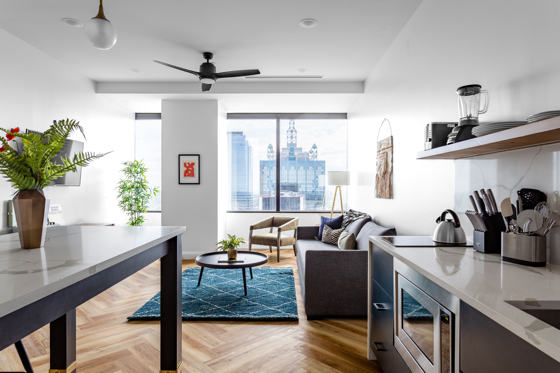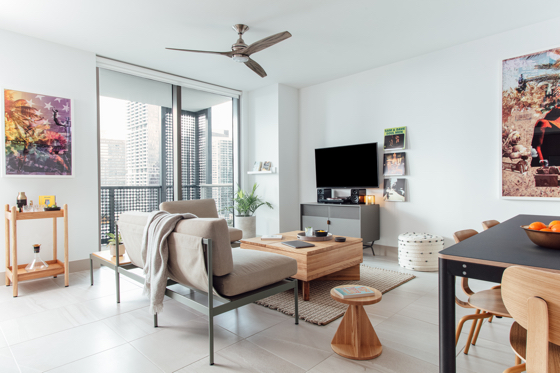The Guild and Mint House are two emerging alternative lodging players in similar, if not the same, space – managing apartment units from building owners and creating more standardized and upscale offerings for traveling workers, digital nomads and vacationers. In interviews at ALIS this week with both brand leaders, among the challenges cited were making sure guests don’t upset individual owners in the buildings, educating the real estate industry about the opportunity, and continually updating their tech stacks to maintain a point of difference they heavily market.
The Guild (founded in 2016 and backed by hospitality icons like Chip Conley, the founding family of Holiday Inn Hotels and Convivialité Ventures, the venture arm of Pernod Ricard) is based in Austin, Texas, and led by Brian Carrico (his wife runs the couple’s four lifestyle hotels in Austin, Texas). It has four locations (Dallas, Miami, Cincinnati) and some 230 units for renters that stay from 14 days to three months.
With a lot of capital reportedly flowing into this space, especially with a lot of empty office spaces looking for an adaptive reuse alternative, The Guild has raised US$50 million. After stepping back during COVID, restructuring to manage with a revenue share model versus leasing space in buildings, Carrico told HOTELS he has another 2,500 units in some 50 buildings in the pipeline.

Over 50% of The Guild’s revenue comes from corporate travel (BT, groups, corporate relocations). The Guild Downtown Dallas, Elm St., which opened in September 2020, reached over 70% occupancy within the first six months of operation with 52% of revenue generated from corporate bookings.
Carrico says 65% to 70% of business comes through direct channels and it now has a sales team responding to RFPs from big corporations. It averaged a portfolio-wide occupancy of 77.33% for the first six months of 2021 and in Miami last month, Carrico said his units ran a 125% penetration index versus his upper upscale hotel competitors. With the restructured management deal there, he said the brand is delivering 40% premiums over traditional and master leases in the building.
A newly launched website refresh highlights The Guild’s approach to tech-enabled boutique hospitality, and doubles down on the rising demand for “blended stays” or “flexible living” accommodations with dedicated landing pages for Extended Stays and The Guild for Work programs.
The Guild’s apartment-like hotel accommodations located in key city hubs come equipped with kitchens and in-unit washers and dryers, and access to perks like grocery stocking, seamless invoicing (inclusive of third-party delivery services), co-working spaces, fitness centers, rooftop pools and even a private members’ club.

New York City-based Mint House has a very similar model to The Guild and has been scaling through the pandemic, according to CEO Will Lucas and new Chief Development Officer Paul Sacco, a former Starwood hotels development executive. Catering more exclusively to corporate business travelers, it has more than 1,000 units in 26 properties in 12 cities, including New York City, Miami, Austin and Nashville. Three capital raises over four years have netted US$50 million.
“Large institutional investors see the trend toward flex multi-family models,” Lucas told HOTELS at ALIS. “They offer risk-adjusted returns with the downside protection of a multi-family home.”
Mint House is also a tech-enabled “hotel company” that operates out of luxury multifamily apartment buildings in coveted downtown locations. Its design forward, apartment-style accommodations have full kitchens, in-suite laundry and many more tech-enabled amenities such as ghost kitchen-driven room service. It also has centralized middleware to help create a guest preference database that more intuitively meets requests.
Lucas said its New York City building with 132 units this year is running double his hotel comp set in RevPAR. He said 60% are direct bookings and that 80% of his guests are remote workers. “We ran 85% in 2020, so it is resilient to downturns,” he added.
Lucas said they are ahead of their business plan and could reach 5,000 units in 18 to 24 months. Expansion could include London and there is also a possibility of creating a joint-venture with a 12-month rental management company.

